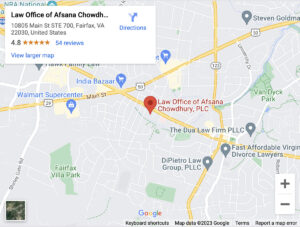Afsana Chowdhury | October 22, 2024 | Divorce

Ending a marriage is never easy. You must navigate a host of emotional, logistical, and legal considerations. In Virginia, you may hear terms like divorce, dissolution, and legal separation–but what do they all entail?
Understanding the differences between these options is critical to making the right choice for your future. Knowing your legal rights can save you time, money, and emotional stress if you’re seeking a quick divorce or want to test the waters with separation. You deserve a fresh start, and choosing the right path will help you get there.
Keep reading to learn more about each of these terms so you can move forward with more confidence.
Divorce in Virginia
Divorce signifies the legal end of a marriage. In Virginia, there are two types of divorce:
- Divorce from bed and board (partial divorce)
- Divorce from the bond of matrimony (absolute divorce)
We’ll talk more about divorce from bed and board in the next section because that is the most synonymous with legal separation. For now, let’s discuss absolute divorce.
Absolute Divorce
A party must have one or more grounds for seeking a divorce. These grounds can include:
- Living separately for a year (or six months if there are no children and the couple has signed a Property Settlement Agreement).
- Adultery, sodomy, or sexual misconduct.
- Conviction of a felony.
- Intentional desertion or abandonment for at least one year.
- Acts of cruelty causing a reasonable fear of physical harm, after one year from the occurrence of such acts.
To add yet another layer of complexity, you may seek a contested divorce or an uncontested divorce in Virginia. A contested divorce means that the couple cannot come to an agreement on important matters like property division, child custody, or spousal support. An uncontested divorce means that the couple is able to work through these important matters on their own.
How you proceed with the commencement of your divorce will depend on the grounds. An experienced Virginia divorce attorney can help you determine the avenue that is right for you and walk you through the divorce process in Virginia.
Legal Separation in Virginia
Virginia does not recognize legal separation as a legal concept like in other states. However, a couple wishing to live apart without having to file for divorce immediately may create a separation agreement. This is a legally binding agreement that is governed by general contract principles. A separation agreement may outline things like child custody, spousal support, division of property, and division of debts.
The other option available to couples not wanting an absolute divorce is divorce from bed and board. In this case, the couple is still married, but they live apart. To obtain a divorce from bed and board, a party must show either:
- Willful desertion or abandonment: this occurs when one spouse leaves the marital home without just cause and intends to remain separated indefinitely.
- Cruelty and reasonable apprehension of bodily harm: this is abusive behavior by one spouse that causes the other spouse to fear for their safety.
It’s important to note that neither of these options ends the marriage nor entitles either party to remarry. However, over time, this type of separation can be converted into an absolute divorce if the couple remains apart and does not reconcile the relationship.
Dissolution
In Virginia, dissolution of marriage refers to the ending of a marriage either through divorce or annulment. We’ve already discussed divorce, so let’s define one more term for you: annulment.
An annulment is essentially a court decree that a marriage was never valid from the start–it never existed. Virginia law states that annulments may be granted in the following circumstances:
- One spouse was already legally married to another person
- The marriage occurred between individuals who are closely related
- Marriages involving individuals below the legal age or those who were mentally incapacitated at the time of marriage
- Where the marriage occurred under conditions of fraud, duress, or coercion.
- Sham or joke marriage
- One spouse was unaware of the other’s felony conviction prior to marriage
- The wife being pregnant by another man without the husband’s knowledge at the time of marriage
- The husband fathering a child with another woman within ten months of the marriage
In annulment cases, courts cannot order spousal support or divide property. If children are involved, child support and child custody matters can be decided by the juvenile and domestic relations district court.
When Should You Talk With a Virginia Divorce Attorney?
If you are considering ending your marriage, the time to seek professional advice is now. The next steps you take will determine your future, so be sure they are well-informed. Talk to an experienced family law attorney in Virginia today.
Contact The Divorce Law Firm of Chowdhury Divorce Law Group in Fairfax, VA
For more information, please contact an experienced divorce lawyer at Chowdhury Divorce Law Group to schedule an initial consultation today. Our law office is located in Fairfax, VA.
We proudly serve in Fairfax County and its surrounding areas:
Chowdhury Divorce Law Group
10805 Main St STE 700A
Fairfax, VA 22030
(703) 271-6519
Our firm is located near you. We have an office in Fairfax
Find us with our GeoCoordinates: 38.8497929, -77.3185772,3047

About The Author

Afsana Chowdhury is the founder of Chowdhury Divorce Law Group, where she is dedicated to protecting the rights of injury victims across Virginia. A George Mason University School of Law graduate, Afsana is licensed to practice in Virginia and has devoted her legal career to personal injury law. She focuses on helping clients, guiding them through divorce, custody disputes, and other complex family matters. With years of experience and a deep commitment to protecting her clients’ rights, she personally handles each case to ensure strong, focused representation.
Location: Fairfax, VA


